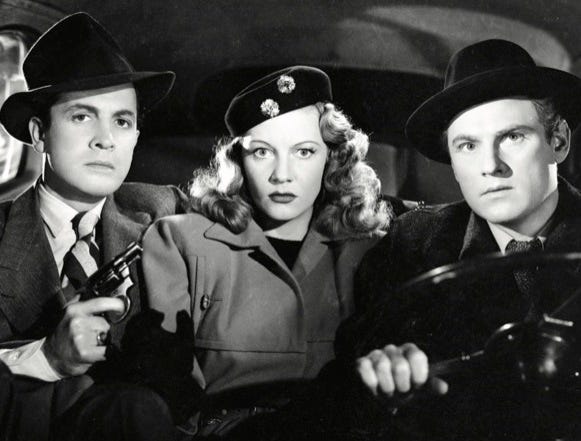Decoy
"The rest of the dough, I leave to the worms"
One of the reasons that Film Noir produced so many transgressive or imaginative movies is that a good chunk of them were low budget B productions. Major studios kept their hands off these projects, so long as they were able to avoid the strictures of the Production Code. As a result you occasionally get weird efforts like Kiss Me Deadly, with its atomic/demonic Mcguffin or Nightmare Alley, set against the backdrop of shadowy carny life.
And with the low, low budget productions of the Poverty Row studios, sometimes anything went. Such was the case with Monogram's weird entry: Decoy (1946).
Decoy opens with a closeup of a man washing blood off his hands. We follow him out the door onto the highway where he hitches a ride back into the city. There he makes his way to an apartment, where he shoots a woman holding a wooden box.
The rest of the film is told in flashback. The character that shoots the woman is Doctor Lloyd Craig, a kindly man who treats the residents of the shabby neighborhood where he resides. The woman is Margo Shelby, the girlfriend of a condemned mobster, Frankie Olin (played by good old King Kong actor Robert Armstrong). When Olin's final appeal fails and he faces the gas chamber, Shelby and her new boyfriend Vincent concoct a scheme to save him and get the location of buried loot from an armored car robbery.
At this point, Decoy begins to resemble one of Monogram's cruddy mad scientist pictures, like The Ape Man or The Living Ghost. Dr. Craig is seduced by Margo, who convinces him to help her revive Frankie after he is killed in the gas chamber by using something call methalyne blue. They snatch his corpse from a hearse and Craig brings him back to life in his office. Armstrong does a solid job of portraying a man slowly coming back to the world from the dead.
From this point forward, the bodies begin to pile up as Margo relentlessly pursues the buried loot. A broken Dr. Craig is dragged along for some unexplained reason and winds up with two bullets in his guts, delivered by a hysterically cackling Margo.
There is one final twist, which adds a level of nihilism to the whole bloody affair. I love nihilistic Film Noir endings.
The film, which was unavailable for decades, developed a cult reputation, mainly due to the scenery chewing performance of Jean Gillie as the uber femme fatale Margo. Gillie was married to the director, whom she met in her native England during the war. She had starred in a string of low budget British movies, then moved with her husband back to Hollywood. Decoy was her first Hollywood movie; she only made one more before dying of pneumonia, sadly.
One reason the movie had as much panache as it did was that it was written by actor Nedrick Young. After he was placed on the Hollywood Blacklist during the red scare, he shifted his focus to screenwriting. He co-wrote the scripts for Jailhouse Rock, The Defiant Ones, and Inherit the Wind. The Defiant Ones won the Oscar for Best Screenplay. Decoy was his first foray into screenwriting.
Young appeared in the excellent Noir Crimewave, which is included on a DVD along with Decoy.
Director Jack Burnhard was a low budget director of little renown. He did direct a favorite film of mine from childhood: Unknown Island, a cheap knockoff of King Kong featuring dinosaurs. Anything with dinosaurs in it was a favorite when I was young and oblivious. The dinosaurs in Unknown Island are some of the worst ever committed to screen, men in rubber suits struggling to move around, but it does have the distinction of being the first color depiction of prehistoric monsters. Burnhard did gain a better acquaintance of more convincing men in suit monsters later in his career, when he assembled the American version of Godzilla Raids Again, re-titled as Gigantis the Fire Monster.
I re-watched Unknown Island after taking in Decoy and was suitably appalled at the effects. But it did remind me of Decoy, with a wacky universe and a cast of characters that clashed violently from the start and marched inexorably to their deserved fates.
That's the joy of low, low budget productions. At their best, they deliver a more extreme experience than would have been tolerated by the old, classic studios. Extremes in violence sometimes, extreme acting and characterization, extremely wild plots, and in every case, extremely shoddy production value.
I wouldn't list Decoy as a masterpiece of Film Noir, but it elevates itself from its poverty row background to make for a short, nasty, and fun watch.
Check out these rubber dinosaurs:

